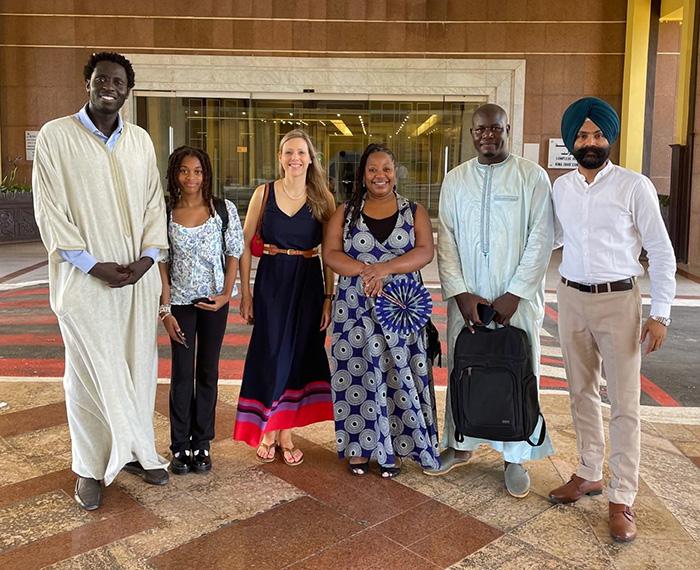
Subscribe to Pittwire Today
Get the most interesting and important stories from the University of Pittsburgh.A Pitt professor is bringing her global perspective to this African medical research partnership

Tiffany Gary-Webb, professor in the University of Pittsburgh’s School of Public Health, has partnered with an African medical research alliance to better understand the prevalence and underlying causes of noncommunicable diseases (NCDs) in Senegal.
The collaboration began during Gary-Webb’s 2023 delegation trip to Senegal with the Center for African Studies, where she met Bamba Gaye, executive director of the Alliance for Medical Research in Africa (AMedRA).
Now, Gary-Webb and Gaye are working with AMedRA cardiologists with a focus on two major NCDs: cardiovascular disease and diabetes. While Gary-Webb brings a global perspective and expertise, Gaye’s on-the-ground leadership and understanding of the local context have been pivotal to the partnership’s success.
“Equity and integrity are at the heart of our partnership, driving our shared commitment to mutual respect, transparent decision-making, and leveraging our respective strengths to achieve impactful, sustainable outcomes,” Gaye said. “My focus has been on ensuring the research aligns with the needs of the local population and achieves impactful outcomes, and (Tiffany) ensures that both African and American contributions are equally valued.”
As executive director of AMedRA, Gaye has spearheaded research initiatives across North America, Europe and Africa, with a strong focus on primordial prevention, cardiovascular health promotion and the epidemiological transition of diseases. His studies — published in leading journals, including Nature Medicine, the New England Journal of Medicine and JAMA — highlight the burden of NCDs in sub-Saharan populations. Through his work, Gaye has consistently championed the representation of African research on the global stage and emphasized the importance of addressing the region’s unique health challenges.
Throughout her career, Gary-Webb has been working on researching NCDs across the globe, with a focus on Black populations in the United States, Jamaica and now Senegal. “Learning about the cultural contexts of NCDs is so important,” she said. “Behavioral factors are very different depending on different settings. Learning from diverse contexts allowed us to build on what we know and help each other understand NCDs in a global context.”
So far, the team has three manuscripts on trends among NCDs under review at global health journals. They have also published a manuscript, which highlights the importance of research and partnerships across the African continent and barriers to collaboration, especially in the field of epidemiology. But thanks to Gary-Webb and Gaye’s collaboration, clinicians in Senegal are learning more about research methods and how they can intertwine research with practice.
“Dr. Gary-Webb’s tireless dedication to facilitating our collaboration has been truly remarkable and instrumental to our success,” Gaye said. “Dr. Ngonè Gaye and Dr. Mame Madjiguene, our brilliant cardiologists, are deeply inspired by Dr. Gary-Webb and are on their way to becoming outstanding methodologists through this collaboration.” Ngonè Gaye’s first author manuscript was recently accepted for publication in Journal of Global Health Economics and Policy.
More opportunities in Senegal
Bamba Gaye served as an instructor during the inaugural Pitt in Senegal Study Abroad Program in May 2024. This summer, Dmitriy Babichenko, clinical professor in the School of Computing and Information Sciences, will lead students on cultural preservation through virtual reality and digitization projects.
Also in 2025, 12 Pitt faculty, PhD students and administrators will join the Center for African Studies’ Fulbright-Hays Group Projects Abroad.
Photography courtesy of Tiffany Gary-Webb

